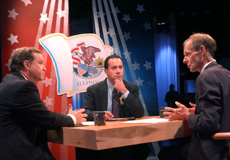Candidates talk live

Shira Weissman
October 15, 2004
Congressman Tim Johnson and Dr. David Gill, candidates for Illinois’ 15th Congressional district, appeared on WILL-TV Thursday night to discuss public policy and answer questions from constituents.
Johnson and Gill spoke cordially before they went on air.
“If I ever have to go to a doctor, I’m going to him,” Johnson said to John Paul, who served as moderator for the debate. Paul is a faculty member in the college of communications and the senior producer of WILL-TV.
But the candidates immediately clashed on the issue of national security and Iraq once the program began. Johnson, after stating that his priority is “keeping America safe,” said Congress has done a good job to make America safer. But Gill said Congress has done just the opposite through the misallocation of resources.
“The president and the Congress has made us less safe,” Gill said. “I agree with Senator (John) Kerry that the war in Iraq was a distraction.”
Get The Daily Illini in your inbox!
Gill said the tax cuts enacted by Congress also diminished the amount of available resources, further damaging the efforts to improve national security. Gill also said that, if elected, he would seek an “exit policy” with a specific deadline for the withdrawal of troops, and emphasized the need to convince the United Nations and the League of Arab Nations that America harbors no motives for permanent occupation.
Johnson said setting a specific date would be outside the powers vested to the legislative branch, as well as too rash a decision to make.
“There is a separation of power,” he said. “Our role is not to micromanage foreign policy … setting an exact date on the withdrawal is not something Congress is prepared to do.”
Johnson also said Congress did not authorize the invasion of Iraq.
“The vote in U.S. Congress was … not a vote to invade Iraq,” Johnson said. “The vote authorized the president to use force if necessary. No one in Congress voted specifically to invade Iraq.”
Regardless, Johnson said the vote authorizing military action was the correct one, regardless of the information provided to Congress. Johnson also dismissed charges that the Bush administration purposely misled Congress with incorrect or misleading information.
Gill countered by citing a St. Louis Post Dispatch poll that said most Americans thought war in Iraq was a mistake. Gill said there was no way that Saddam Hussein and Osama bin Laden would have had any connections due to their ideological differences.
“Hussein could not be more secular; Osama bin Laden could not be more religious,” Gill said. He added that Iraq was “more boxed in than any other country in history.”
The debate became particularly heated when the candidates began to discuss health care, the centerpiece of Gill’s campaign.
Gill said he decided to run for office because he recognized the need to push for a national health care program. He thought Congress failed to provide the people with the necessary laws to alleviate the burdens placed on Americans.
“Ninety-five percent of (the 45 million who are uninsured) are working full time,” Gill said. “They aren’t just sitting around.”
Gill said while Americans pay more than twice as much as anybody else, the quality of their health care was ranked only 37th by the World Health Organization.
Johnson countered that while it is important for Congress to address the health care situation, there were alternative and more efficient means to solve the situation which the legislature is working on. Johnson said a national health care program would increase red tape and waiting time for patients, citing that Canadians must wait “62 weeks for general surgery” under their national health care program. He also said the Congress’ efforts in passing the prescription drugs bill to alleviate the burdens on seniors was a big step.
“Imperfect as it is, it is a significant improvement,” Johnson said.
The most tense standoff occurred when Gill criticized Johnson’s attendance records in the House Committee on Agriculture. Gill said Johnson failed to appear in 79 percent of the meetings.
“Our Illinois farmers deserve better,” Gill said.
Johnson responded by saying that “98 percent of the job is dedicated to constituent services” while emphasizing his experience as a public servant in an effort to differentiate himself from Gill, who is running for public office for the first time.
Edward Burns, a junior in communications who watched the program at the WILL-TV studio, thought Gill performed better.
“I thought Gill handled himself well,” Burns said.
Burns also thought Johnson, in contrast, appeared abrasive, particularly when responding to Gill’s criticism about his attendance at the agriculture committee.
“He should have explained why he wasn’t there instead of just dismissing it,” he said.
Paul said the programs were intended to serve the public in choosing who would represent their interests the best.
“My role is to provide a forum so that people who wish to watch and be better informed can be,” Paul said.
Paul, however, wished there was more time so they could touch on more issues and to go into greater depth in the discussion of those issues.
The TV program was the first of three programs called By the People: Election 2004 that will air in October. Next week’s program will feature candidates for the 103rd district State House of Representatives race at 7 p.m. on Oct. 21.






